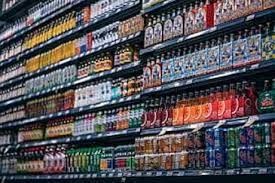
The beverage sector in Nigeria is experiencing slower growth due to high tax burdens. This is in addition to the systemic challenges manufacturers face in the current economic environment, including rising inflation rates, forex volatility and declining demands. With many of the companies in the sector already recording huge losses, there is an imminent threat that increased pressures could lead to outright closures and result in massive job losses. Alas, amid these real, almost existential level crises facing the country, some internationally funded groups persist in advocating for more taxation for the overburdened beverage sector.
As operational costs continue to rise, coupled with the apparent steady decline in the purchasing power of consumers, a natural vacuum is created – sadly, it is a gap that is being filled with counterfeit and adulterated products. The media is already awash with stories of NAFDAC cracking down on the illegal activities of counterfeiters of consumer goods, particularly for sweetened beverage products. This is a troubling trend that signals danger for the health and wellbeing of many unsuspecting Nigerians. As most concerned stakeholders, including industry experts and consumer advocates have pointed out, the push for more taxes will only widen the gap and encourage more counterfeiting leading to significant health challenges and loss of revenue to the government. Organized private sector including small businesses in the sector are calling out for help, stating that any increase in taxes at this time when the sector is trying to stabilize will lead to rather dire implications for the manufacturing sector. They argue that incessant increases in tax targeted at an already struggling industry would adversely affect their productivity, ability to remain profitable and ultimately lead to massive downsizing and in some cases, closures. As expected, such an outcome would only translate to the loss of millions of Nigerian jobs that are generated by the sector each year. To put this in context, it is worthy to note that the sector already contributes about 40% to 45% of its gross earnings as tax to the government, and as of 2022, generated 1.5 million jobs.
They argue further, that outside the economic issues, there are also other associated stress and health concerns that accompanies the fear of losing one’s means of livelihood that can lead to the overall mental and emotional health of Nigerians. Citing researchers from Duke University, unemployment can significantly raise several health issues including hypertension and the risk of heart attack. Heart experts who agree with the findings of the study reveal that it supports evidence that certain types of stressors, like unemployment can significantly ramp up the occurrence of cardiovascular events in the country.
With the renewed call, proponents of the Sugar Sweetened Beverage Tax (SSB) are urging the government to use increased taxes to curb sugary drink consumption. They believe the taxes will reduce the burden of obesity and diet-related, non-communicable diseases (NCDs), and potentially lead to a healthier population. For that reason, these groups are calling for a substantial 1,200 % increase in the current SSB tax from N10 per litre to N130 per litre.
Whereas taxation can reduce the affordability of these beverages and consequently their consumption, there is little or no evidence that supports the reasoning that it will result in the reduction of obesity or improve a healthier lifestyle. According to 2020 report by the Nigerian Bureau of Statistics (NBS), the average Nigerian spends only about 1.4% of their total monthly expenditure on non-alcoholic beverages. The sugar intake from this translates to a mere 5.1% of their entire amount of sugar consumed. This largely suggests that non-alcoholic beverages may not be the reason for their overall increased sugar consumption.
Also, according to the National Sugar Development Council (NSDC), Nigeria’s sugar intake is lower than most countries. In 2021, the per capita sugar consumption in Nigeria was approximately 8kg. This is significantly lower than the global average of about 21.4 kg per person and the WHO-recommended limit of 9kg, an indication that Nigerians fall within the limit of World Health Organization’s (WHO) recommended daily sugar intake. Moreover, the most recent assessment of SSB taxes effectiveness undertaken by WHO’s Guidelines Review Committee confirms the lack of evidence and WHO is still unable to grade SSB taxes as a best buy-intervention.
Most analysts maintain that if the Nigerian Government were to give in to this call and increase taxes, that singular act would signal a major policy inconsistency. Recall, that the government is frantically trying to attract investments into the sugar sector in line with its vision of attaining self-sufficiency in the production of sugar locally. So, how can the government in the same vein discourage the use of sugar in industrial production when Nigeria is below the WHO recommended benchmark?
As this debate continues, it is critical to acknowledge that SSB taxes aren’t a novel form of fiscal policy. Such taxes have been used to regulate tobacco, foods with saturated fats and sugar sweetened beverages across the world. However, experiences from other countries suggest that these types of policies aren’t as effective and, in most instances, are more disadvantageous than expected.
The ‘fat tax’ in Denmark is a perfect real-life example illustrating the limitations of using tax as an anti-obesity policy.
During the period that the tax was implemented, the Danish economy was impacted negatively – inflation rose to 4.7% and real wages fell by 0.8 % in a year. Outside of the immediate economic impact, there were no veritable health benefits – only about 7% of Danes reduced the amount of saturated fat food items they consumed. According to a survey, about 80% of the population did not change their shopping habits at all; most just sought for alternative options or went across the border to shop.
This type of consumer behaviour leads into the argument that such SSB taxes in Nigeria will ultimately create a ‘black market’ for soft drinks and related products and drive consumers to seek alternatives across neighbouring countries. A worse scenario is possible with consumers falling back on unhealthier, unregulated and in many cases counterfeit substitutes.
Experiences from Mexico, Ireland and the United Kingdom supports the argument that SSB taxes intended to cut sugar intake and obesity rates, have indeed missed their marks as obesity rates continue to rise. According to an IMF and OECD report on taxation in Chile published in 2020 the effect of tax on the intake of sugary drinks did not translate to an overall decrease in the consumption of sugar.
Industry watchers suggest that the debate over SSB taxes needs to move beyond simplistic narratives, as it requires a more holistic approach. It is critical that organisations like CAPPA and other health proponents focus their attention on building education campaigns that supports consumers lifestyle modification, instead of promoting the single narrative that SSB is responsible for obesity and NCDs in Nigeria. Ultimately, collaboration is key to finding solutions that ensure the industry continues to thrive, creating jobs, fostering economic growth, as well as upholding public health.
 DailyrecordNg …Nigeria's hottest news blog
DailyrecordNg …Nigeria's hottest news blog







